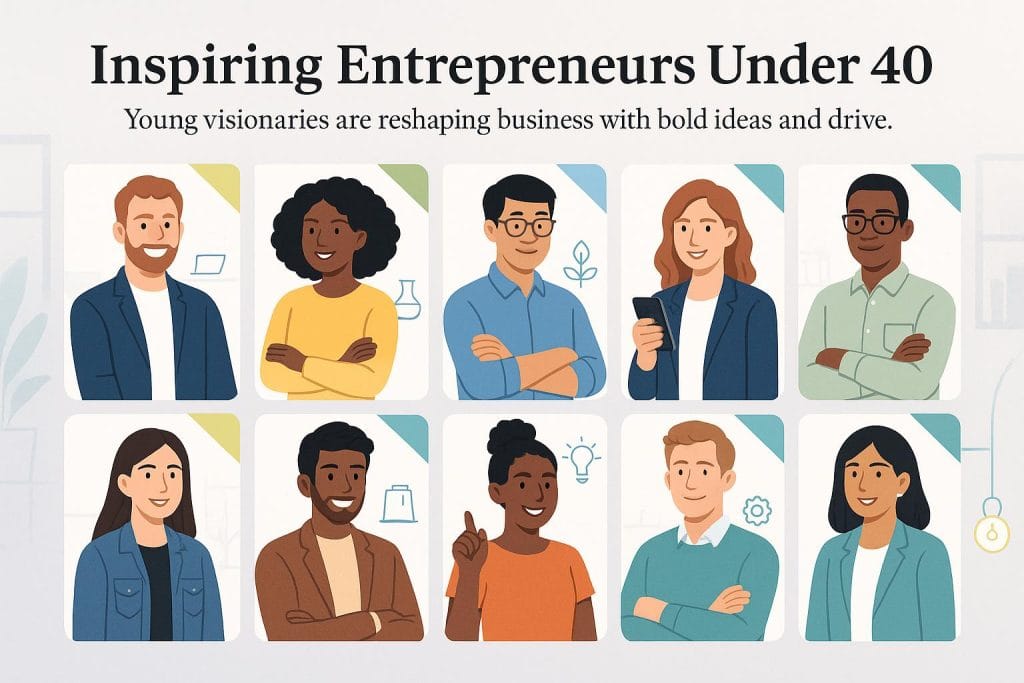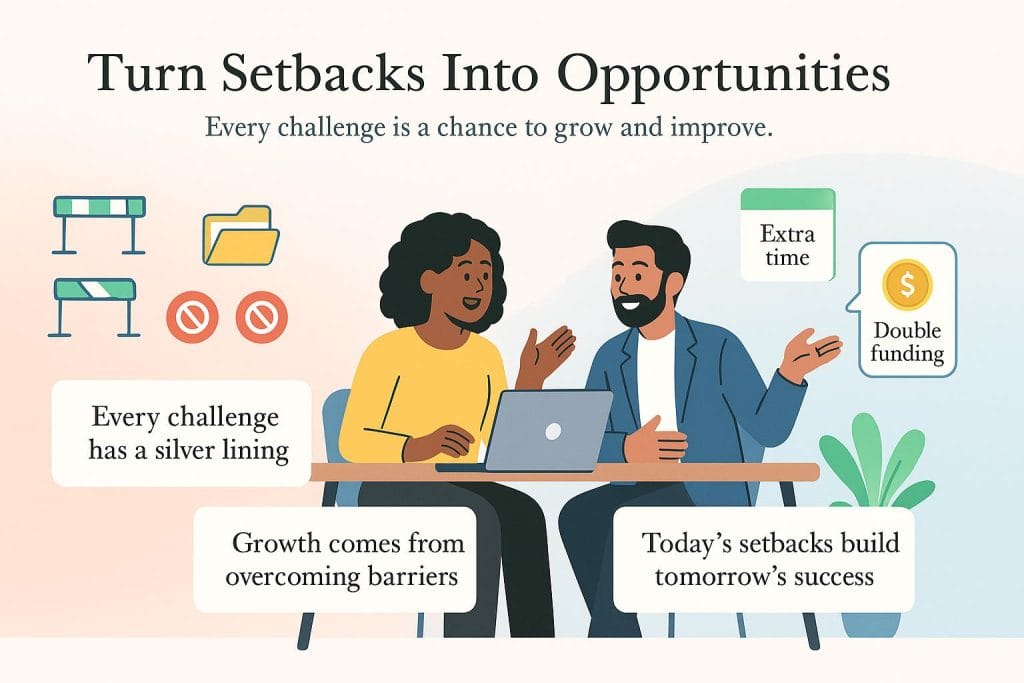We often look to our elders while navigating the trials of life. However, when it comes to entrepreneurship, younger generations are often the ones leading the way with bold ideas, fresh thinking and serious grit. Many shake up the status quo while pushing the boundaries of what’s possible. In fact, some of today’s most successful companies were launched by entrepreneurs under 40.
Inspiring young business owners under 40
Each of these young entrepreneurs turned a big idea into a real business. If you’re thinking about starting your own, there’s much to learn from the paths they took.
1. Allison DeVane, 34, founder of Teaspressa
Allison DeVane’s entrepreneurial journey began with a laundry cart on the streets of Phoenix and a clever play on words. Focused on making tea cool “even when it’s hot,” Teaspressa — a blend of the words “tea” and “espresso” — was born.
In 2015, DeVane began brewing patent‑protected tea shots served like espresso, handing out free samples to anyone who would try them. She later pitched her idea on Shark Tank and built the company from the ground up.
Although achieving her dream wasn’t easy, DeVane still owns 100 percent of Teaspressa with over 2,200 shops worldwide and an online shop that sells tea-related products. According to the Shark Tank blog, the company generates around $1 million in annual revenue.
2. Josh Feinsilber, 24, founder of Gimkit
At 24, Josh Feinsilber is the youngest entrepreneur on this list. He started Gimkit in 2017 when he stumbled across Kahoot, an application that allows teachers to test their students’ knowledge with quiz games. Feinsilber took that simple idea and decided to improve upon it.
Gimkit, which provides interactive games for teachers and students, quickly grew to over 3 million monthly users. In 2023, Feinsilber and his team launched Gimkit Creative, a sandbox mode that lets users design their own custom games without any coding. Today, Gimkit is a popular educational tool used by millions of students and teachers around the world.
3. Derrick Hayes, 37, founder and CEO of Big Dave’s Cheesesteaks
Philadelphia native Derrick Hayes launched Big Dave’s Cheesesteaks in 2014 out of a 700-square-foot gas station in Dunwoody, GA. Named after his late father, the brand was born from a mission to bring authentic Philly cheesesteaks to the South. Hayes overcame poverty and personal struggles to grow Big Dave’s into a beloved Atlanta staple, with locations in Downtown Atlanta, Doraville, Lawrenceville and Forest Park, plus a food truck and a spot inside Mercedes-Benz Stadium.
In 2024, the flagship store moved to a new location on Marietta Street after a water main break shut down the original. Hayes has since taken the brand across state lines, opening in Charlotte, NC, and securing a five-store franchise deal in South Carolina. He also teamed up with former PepsiCo exec Derek Lewis on a 10-unit franchise expansion in Florida — part of a bigger goal to hit 100 locations by the end of 2025. Big Dave’s is also now the official cheesesteak of the Orlando Magic.
4. David Karp, 38, founder of Tumblr
At 38, high-school dropout David Karp is a tech success story worth an estimated $200 million. After teaching himself HTML at age 11 and landing an internship at 14, Karp launched Tumblr, a microblogging platform, in 2007 when he was just 20. Instead of focusing on making money, Karp was driven by passion and committed to keeping Tumblr a creative space for self-expression.
By 2013, Tumblr hosted over 190 million blogs and was sold to Yahoo for a staggering $1.1 billion. Karp stayed on as CEO until he stepped down in late 2017 to explore other ventures.
Recently, Karp has tested the waters in the film and TV industry as a co-producer of a documentary that won a Best Feature Audience Award at the Milwaukee Film Festival.
5. Brian Keller, 35, co-founder and co-CEO of Love Your Melon
This heartwarming story began in a University of St. Thomas entrepreneurship class, when Brian Keller and his friend Zach Quinn launched Love Your Melon in 2012 with a goal of delivering a hat to every child battling cancer in the U.S. (about 45,000 at the time). Over the years, the company has donated over 230,000 beanies and contributed more than $9.4 million to pediatric cancer research.
In 2022, Love Your Melon was acquired by Win Brands Group, but its impact only grew. Today, 50 percent of net profits still support nonprofit efforts, and the brand continues to focus on purpose-driven giving.
In 2024, Keller expanded his mission by launching Rorra, a sustainable venture focused on providing clean-water filtration systems for homes. His ability to pair a strong sustainable business model with meaningful impact proves that businesses can do good and do well.
The pursuit of profit alone won't cut it for businesses starting out in this more socially conscious era. The
triple bottom line emphasizes the three P's (people, profit and planet) as the key drivers of a brand's success.
6. Evan Spiegel, 35, co-founder and CEO of Snap, Inc.
Based on the wild success of Snap, Inc., the parent company of the viral photo and video sharing app Snapchat, you’d never know that it started in a college dorm room. While in school, Evan Spiegel created Snapchat with his Stanford University classmate Bobby Murphy, and officially launched the company in 2011. As of the first quarter of 2025, Snapchat has surpassed 460 million daily active users, according to Statista — a trajectory that helped co-founder and CEO Spiegel become a billionaire at age 25.
In 2017, Spiegel and Murphy also partnered to create Snap Foundation, a nonprofit dedicated to developing creative career pathways for underrepresented youth in Los Angeles, and have pledged to donate 13 million shares in Snap stock to the foundation. That same year, Spiegel also launched the Spiegel Family Fund, dedicated to supporting multiple human rights, housing, arts and education organizations.
7. Melanie Perkins, 38, CEO and co-founder of Canva
Popular online graphic design and editing tool Canva is led by CEO Melanie Perkins. The Australian native’s startup venture, co-founded with now-husband Cliff Obrecht, has been dubbed a “unicorn” in the startup community because of its profitability, reportedly generating $2.7 billion in revenue as of mid-2024. The company, which officially launched in 2013, has over 220 million monthly active users, including 95 percent of Fortune 500 companies.
The newest and ongoing adventure for Perkins is the integration of artificial intelligence (AI) in Canva. In March 2023, the company introduced AI tools that translate text into design templates, and has continued building out features like Magic Studio and Canva Sheets. As AI evolves, we expect Canva will, too.
8. Alex Schulze, 33, co-founder and CEO of 4ocean
During a trip to Bali with his friend Andrew Cooper, Alex Schulze was dismayed by trash washing onto the beach. The two decided to clean up the ocean and build a sustainable business, founding 4ocean with the One Pound Pledge: For every item sold, at least one pound of waste gets pulled from the water.
They’ve since introduced an impressive PixieDrone, a Roomba‑style robot that scoops up floating debris (holding about 132 lbs per mission). By the end of 2024, 4ocean had pulled over 40 million pounds of trash from oceans, rivers, and coastlines globally. [Read Related Article: Can You Make a Profit and Be Socially Responsible?]
9. Everette Taylor, 36, CEO of Kickstarter
The man behind the popular crowdfunding platform Kickstarter, Everette Taylor, has been CEO since 2022, a position he attributes to luck. The experienced entrepreneur was contacted by a board member at Kickstarter, who read an article featuring Taylor in his then-role as chief marketing officer at Artsy. Although Taylor has an impressive resume, luck hasn’t always been on his side. As a young man, Taylor experienced homelessness and dropped out of college. It wasn’t until he founded event marketing startup ET Enterprises that he began experiencing success.
As CEO, Taylor has implemented a compressed work schedule (a four-day workweek) to boost morale and improve productivity. His most recent business move has been an appointment to the board of directors at 1stDibs.com Inc., a luxury design online marketplace.
10. Whitney Wolfe Herd, 36, founder and executive chair of Bumble
Before starting Bumble, Whitney Wolfe Herd was Tinder’s vice president of marketing. After tensions and a sexual harassment lawsuit, she left Tinder in 2014 and launched Bumble, a dating app aimed at empowering women. The app became so popular that in 2021, at just 31, Wolfe Herd led Bumble’s IPO, making her the youngest woman to take a company public.
Wolfe Herd served as CEO from Bumble’s inception through 2023. In 2024, the company hired a new CEO with a tech background to lead its push into AI, and Wolfe Herd transitioned to the role of executive chair. She says she founded Bumble to address “the problem that I shared with so many other women … to be treated as equals in our relationships.” And it’s clear she succeeded — Bumble now counts millions of users globally, firmly establishing her vision. [Read Related Article: Inspiring Quotes From Trailblazing Women We Admire
Find a mentor if you're just getting started in your entrepreneurial journey. Many successful entrepreneurs attribute their successes to the people who took them under their wing as guides in their respective fields.
Tips for aspiring young entrepreneurs
If you have your sights set on starting your own business, here’s how to find success as a young entrepreneur.
Start with your passions and skills.
Make note of the things that make you happy, whether it’s a hobby or something in your professional life. Once you identify a potential avenue, ask yourself if you have strengths in that area and if you could share that knowledge with others.
While passion and skill are vital, the needs and wants of consumers drive the market and ultimately determine whether your business will succeed. Survey the market, friends, family and acquaintances to find a need or want your proposed venture could fulfill.
Take advantage of technology.
Ryan Paugh, co-founder of Community.co and a founding member of Young Entrepreneur Council, credits much of his early success to using digital tools to connect, learn and grow. He believes today’s young entrepreneurs have more access than ever before to global resources, expert advice and scalable solutions — all thanks to technology.
“The biggest edge young entrepreneurs have right now is technology, especially AI,” said Paugh. “AI can help you write pitches, draft business plans, create marketing copy [and] prototype products. If your goal is independence and building something of your own, there’s never been a better time to start.”
Pitch investors.
Funds are often needed upfront to get a new business off the ground. Take the time to develop a solid investor pitch and explore different ways to find business investors who align with your goals. Focus on what your product or service is, why it matters, what kind of funding you need, and how it would impact your business.
Government loans for entrepreneurs can help you get your business off the ground, often with lower interest rates and more flexible repayment terms than traditional bank loans.
Join a professional association.
Making the right connections can be an invaluable resource in the business world. Paugh recommends joining professional associations, organizations and groups that align with your mindset and values, noting that this provides access to people whose strengths and experiences complement your own
“It also helps with something people don’t talk about enough: the loneliness of entrepreneurship,” Paugh explained. “Being part of a group where you can share, collaborate and find support is critical not just for business growth but for your mental well-being.”
Don’t put off your dreams for the “perfect” time.
Many would-be entrepreneurs hesitate to make their dreams a reality because it’s not the right time. But according to Paugh, the so-called “right” time doesn’t exist.
While launching a business during an economically unstable period can be intimidating, don’t let the data scare you off if you feel ready.
“Many of the most iconic companies were born during recessions,” said Paugh. “Nearly half of the Fortune 500 was founded during periods of economic downturn. Crisis always creates openings — for those who are bold, observant and forward-thinking enough to spot them.”
For entrepreneurs ready to take the leap, Paugh encourages them to start now, move fast and embrace uncertainty.
“If you’re willing to take the hits and keep going, the payoff can be life-changing,” he added.
Julianna Lopez contributed to this article.










